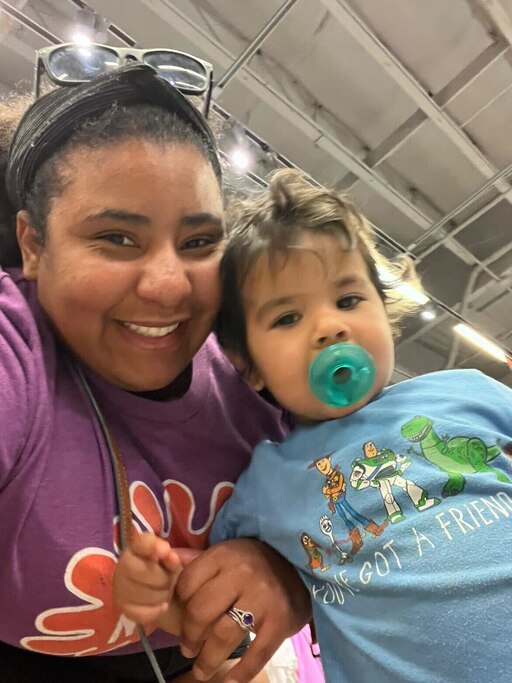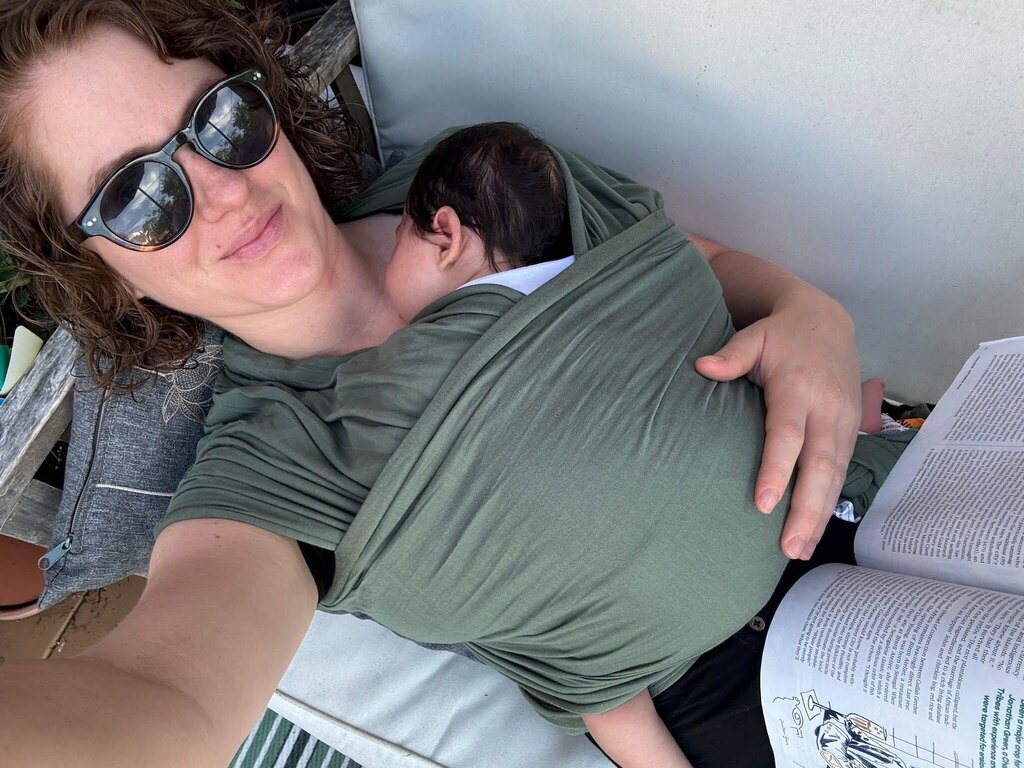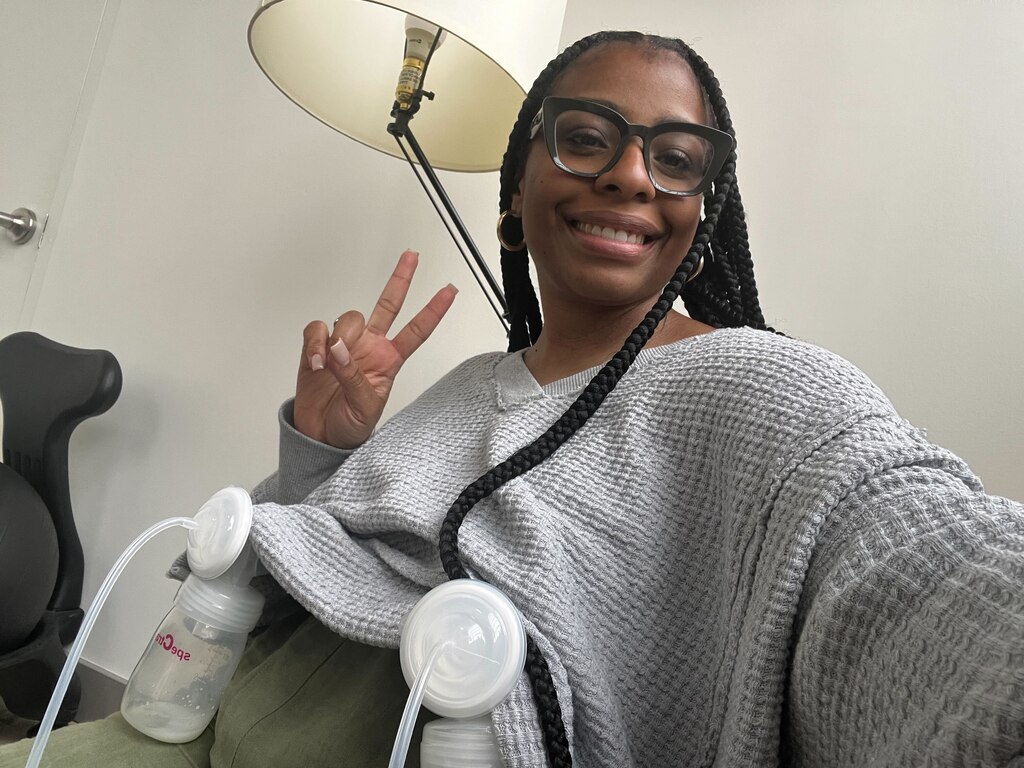I felt unworthy of motherhood within the first 12 hours of delivering my son.
I thought I’d wake up after 20 hours of labor with him on my chest preparing to feed in our matching sage-colored outfits. But breastfeeding in real life is nothing like the movies.
Instead, I stared at the speckled hospital room ceiling, arms crossed and pouting like a child told “no” too many times. I thought I failed because my milk hadn’t come in yet. I felt inadequate when he cried and watched my husband scramble to give him the hospital-issued bottles of formula. As someone who experienced a traumatic miscarriage the year before, I thought my body was disappointing me again.
As I sit back now and try to understand why I was immediately so hard on myself and attacked my own competence as a mother, it all leads back to the societal pressures to breastfeed.
The Baltimore Banner thanks its sponsors. Become one.
The expectation can be debilitating, persistent and intimidating as a new mom. It doesn’t seem to matter that someone has every intention to take care of their child. If breastfeeding isn’t involved, those efforts apparently equate to zilch.
Every woman’s body and every child is different, yet all moms are expected to breastfeed. And that expectation is often the gateway to gauging whether someone’s a “good” mom. Moms have the right to nourish their baby the way that works for them without judgment or debate.
Before the mobs start sharpening their pitchforks, I know how beneficial breastmilk is to babies. Breastmilk provides babies with antibodies that strengthen their immune system and is an unmatched source of nutrition. It’s also less expensive than formula.
I’m not anti-breastfeeding. I am against the cult-like, toxic and woman-bashing conversations it can evoke. And honestly, I don’t think it’s even appropriate to ask a woman if she breastfeeds.
While several health organizations recommend breastfeeding for the first six months of a child’s life, that’s not always favored or physically possible for some. And though I always knew I wanted to at least try breastfeeding, I know I’m not alone in questioning my capabilities from the jump because of what I heard or read.
The Baltimore Banner thanks its sponsors. Become one.
Jennifer Hook-Wade, a 32-year-old mother in Southern California, also couldn’t breastfeed the first couple of nights after she had her son AJ.
“It was such an overwhelming feeling of failure right out the gate,” Hook-Wade said.

Everything she read online talked about how breastfeeding was the best. Luckily, one nurse eased her worries by telling her breastfeeding is fine but “fed is best.” It was one of the first times she heard that, and speaking with her aunts and mother-in-law reaffirmed for her that it wouldn’t be abnormal if she didn’t breastfeed. It hasn’t always been as reinforced as much as it is now, they told her.
“That pissed me off, like why put so much pressure on new moms like that?” Hook-Wade questioned.
Even though she couldn’t exclusively breastfeed, she was able to pump. Pumping became more of a burden when she went back to work, but she was happy to do it for at least a year, and was even happier when she was done with it.
The Baltimore Banner thanks its sponsors. Become one.
One doesn’t know true desperation until they have to pump in a public bathroom or car; breast engorgement is cruel and unusual.
Maddy Stokes just returned to work as the chief operating officer at UpSurge Baltimore. Breastfeeding was a personal choice, but the 35-year-old is also mindful that breastfeeding is no walk in the park.

“This is natural? This doesn’t feel natural. It feels painful,” Stokes said.
She used affirmations to help her through pregnancy, delivery, postpartum and the return to work. One reads, “I’m proud of my body and how it’s supporting me,” because the “mind can really spin if you have a bad feeding or a bad moment,” Stokes said.
As a “recovering perfectionist,” Stokes still tends to pressure herself and doesn’t underestimate how reliant her daughter is on her to eat. It’s not as easy rising to her “Wonder Woman” demeanor these days, but she has herself and a strong circle of support.
The Baltimore Banner thanks its sponsors. Become one.
“I’m grateful for the people who value what I am doing and remind me I don’t have to be a prisoner to this. … I can change my mind at any minute and my baby’s happy and healthy,” Stokes said.
Parents also have to worry about introducing a bottle too soon. Or, not staying on a strict enough schedule to produce a milk supply. Or avoiding bottles and formula altogether because they think they are inferior. Mothers also worry they can’t develop a strong mother-baby bond without breastfeeding.
Add in the oh-so-lovely influence of social media where influencers and over-suppliers share their “methods” and “advice,” making the just-enough-ers feel like there’s something wrong with them. People may say there’s no use crying over spilled milk. Well, when it’s milk that a tired mom pumped at 3 a.m., there are tears, rage and doubt.
Nia McCoy, a communications specialist based in Northwest Baltimore, dealt with the challenges of social media after having her daughter nine months ago. The 27-year-old felt pressured to switch to formula because her daughter had lost weight by her second-day checkup. The suggestion to supplement with formula made her feel so inadequate, she cried in the car after the appointment. Nonetheless, Nia stuck with breastfeeding.
“Breastfeeding was way harder than I expected. TikTok made it look effortless, but for me, it was stressful and emotional. I didn’t overproduce as I hoped and became a ‘just-enough-er,’ which only added pressure,” she said.
The Baltimore Banner thanks its sponsors. Become one.

Eventually McCoy did end up producing more than enough, and she found a sense of accomplishment and appreciation in providing for her baby girl. But she believes there are invisible stigmas working moms face and that people should “be mindful and let moms do what is best for them and their kid.”
“It’s their choice. Period,” she said.




Comments
Welcome to The Banner's subscriber-only commenting community. Please review our community guidelines.